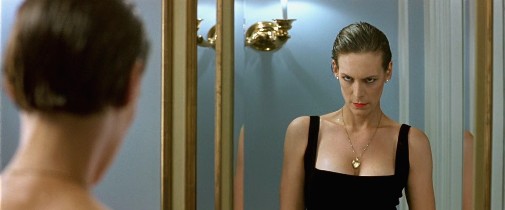
When announcing his honors for the year's first half, Nathaniel cited Jamie Lee Curtis among his Supporting Actress favorites. If Everything Everywhere All At Once keeps its buzz going into the awards season properly, we might see Curtis among this year's Oscar contenders. This Hollywood princess turned erstwhile scream queen has had a storied career full of outstanding performances, and it's about time the Academy pays her respect. Maybe the reason for her nomination-less state is that Curtis' best work tends to happen when she's playing in genre pictures – comedy, action, and horror. Such is the case of 1994's True Lies, a James Cameron-helmed action-comedy for which the actress got some buzz.
As we wait to see how Curtis' new Oscar hopes pan out, let's look back to the 90s and re-examine the actress' take on the character of Helen Tasker…
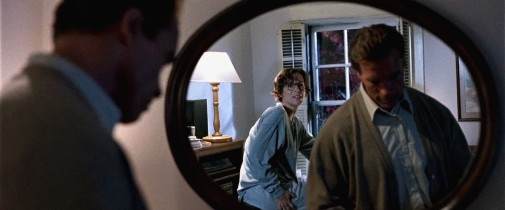
Despite execrable politics and problematic gender dynamics, it'd be a lie to say True Lies doesn't work. Remade from the 1991 French movie La Totale!, the blockbuster started life as one of Arnold Schwarzenegger's pet projects. The Austrian muscleman thought himself the perfect star to play a James Bond-type, suavely fighting terrorists across the globe while trying to keep up a dangerous charade back home. To his wife, the spy is nothing if not the most boring of everyday businessmen, the sort of person for whom adventure is a dirty word. All this to say that, with its blend of 007 parody and screwball antics, True Lies is the most atypical entry in James Cameron's filmography, give or take Piranha II.
Starting with the obvious, this is the director's only comedy, working on a tonal wavelength much lighter than anything Cameron had tried before or has attempted since. Moreover, by taking its cues from Brosnan-era Bond and Hitchcockian wit, there's a particular type of high-class glitz that feels against the working-class sensibilities so common to this auteur's oeuvre. In contrast, the pure action scenes exemplify Cameron's typical brio when it comes to eliciting thrills. They further shine with a sense of directorial confidence that's sometimes missing from the overstuffed picture's farcical setups.
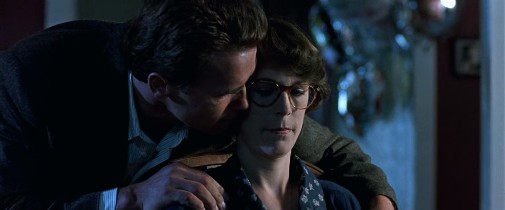
But of course, that doesn't mean True Lies fails as a comedy. Indeed, we're talking about a frequently hilarious motion picture whose entertainment factor is high enough to make many overlook the screenplay's disquieting facets. Nevertheless, what makes the comedy work isn't the same as what makes the adrenaline-pumping sequences pop. Cameron's formal virtuosity and taste for melodramatic emotion are the key to the latter. In the former, however, the actors do most of the hard work, taking control of the screen and script. They can't overcome the racism and sexism of the text, but they put up a good fight. This is especially true whenever Jamie Lee Curtis is the focus.
After a GoldenEye-inspired opening has established Harry Tasker as a glamorous superspy hunting the Crimson Jihad, we get our first glimpse of his home life. Perpetuating the charade of a boring businessman a bit too convincingly, he's a distracted husband whose wife visibly yearns for attention. At first, the camera does little to emphasize this, allowing Curtis to set the pace for our understanding of Helen, her particular frustrations, and hidden desires. She makes sure the audience knows about them before Harry does. More importantly, she does it with impeccable timing and comedic understatement, a dash of aching sincerity.
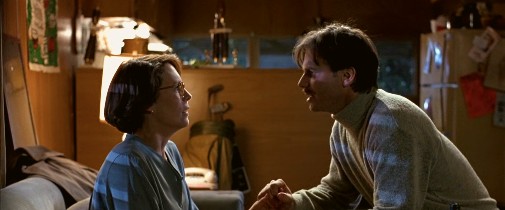
Such is her charm that it's impossible to resist allying oneself with Helen as the narrative unfolds, feeling for her even when some plot machinations suggest laughs at her expense. The bored wife has found herself seduced by a scuzzy charlatan, a car salesman who convinces her that he's a spy. Once Harry finds out, he decides to use his actual superspy resources to scare off his wife's would-be lover. He also uses said resources to give the woman the spice she wants, faking a plot that makes her feel sexy and alive for the first time in years. Before this storyline can go anywhere, the terrorists return, pulling the comedy back into squarely action territory.
Curtis goes through a rollercoaster of tonal registers, a character arc that would stink of misogyny if not for the actress's skill at juggling and circumventing the screenplay's pitfalls. Notice the depths of disappointment she plays early on, framing the giddiness of potential infidelity with sadness. Her office-bound interludes suggest sitcom contrivance, but Curtis resists the temptation of flat humor. Later, as she gets misled, there's a delicate balance between the intelligence inherent to the star's screen presence and the guilelessness that overcomes Helen in the face of danger. One gets a sense of erotic longing underlying every interaction, a thrill-seeking high that overrides reason.
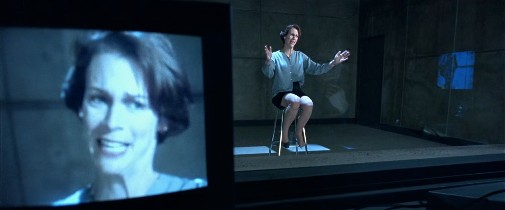
And yet, Helen is no natural femme fatale, nor is she comfortable with seeing her fantasies made into reality. Awkwardness is the name of the game when it comes to Helen's dive into the spy shenanigans of men eager to manipulate her. The physicality is astounding, juxtaposing clumsy nerves with a growing awareness of the body as an object of desire. As instruments, face and voice play slightly different harmonies, echoing visceral realities that ground both character and movie. Look no further than the interrogation scene to see Curtis' powers in full bloom, her countenance going from animal fear to fury, shame bleeding into rueful self-reflection.
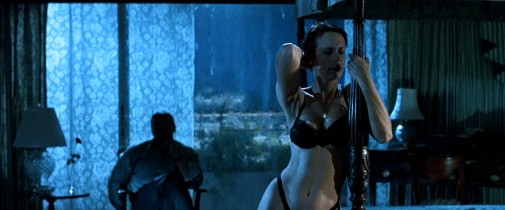
Another stand-out moment finds Helen, code name Doris, pretending to be a prostitute to plant a bug in some French guy's hotel suite, unbeknownst to the fact she's playing seductress to her own husband. Again, it's a masterclass in screen acting, juggling discordant notes to splendid effect. Starting in the corridor, where she gives herself a quick makeover, Curtis plays Helen's preparations as broad comedy mixed with the serious matter of a woman finding herself sensual for the first time in who knows how long. The scene only gets trickier as Helen is instructed to undress for the mysterious man.
The rehearsed pratfall is justly famous, but the entire striptease is a miracle of negotiating between palpable erotica, a whisper of liberation, and even a good amount of character drama. Consider how projected self-confidence wilts, revealing vulnerability when it seems the encounter will become more carnal than anticipated. In a flash, True Lies turns heartbreaking, only to bounce back to its high-concept hijinks once a hoard of assailants comes crashing into the room. This is the peak of Curtis' performance and would have made for a bombastic, if uncommonly risqué, Oscar clip. Having said that, the remaining film isn't devoid of great actressing by any means.
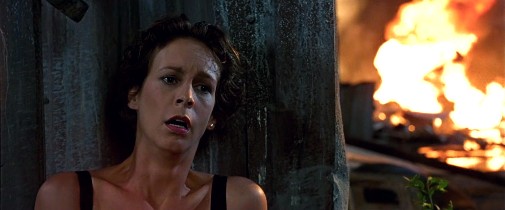
As it turns out, Jamie Lee Curtis is nearly as accomplished an action star as she is a comedic powerhouse. Her work in this milieu isn't as specific, but she still anchors the movie's ever-growing scope with heartfelt humanity. One should also consider how she never quite gives up on the scenario's humorous possibilities, finding the threshold of drama and jumping over it without allowing the character to feel false. Her screams do a lot of the heavy-lifting, but her elastic expressions deserve mention, too. All in all, it's a perfectly calibrated piece of acting that helps make True Lies a triumphant domestic epic.
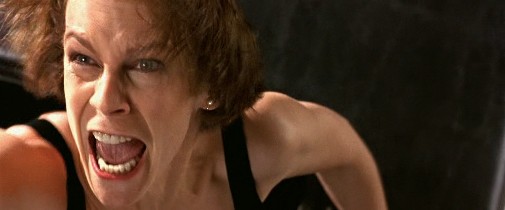
Throughout its awards season, True Lies primarily scored nominations for two elements. First, there are the special visual effects that earned the picture its only Oscar nomination. Secondly, we have Curtis' fabulous performance, which won the Golden Globe for Best Actress in a Comedy/Musical and scored a SAG nod for Best Supporting Actress. Additional honors include a Saturn Award win, another victory from the American Comedy Awards, and mentions from the Blockbuster Entertainment Awards and the MTV voters. However, you'll notice that different organizations recognized her differently - sometimes as a leading lady, sometimes as supporting actress. Perhaps that category confusion hindered the thespian's Oscar chances, splitting support into two races, thus preventing her from getting recognized in either.
As far as I'm concerned, she's a clear co-lead alongside Arnold Schwarzenegger. Indeed, I think she's better than all of that year's Best Actress Oscar nominees, a historically messy lineup many denounced as a weak selection. They were Jodie Foster in Nell, Jessica Lange in Blue Sky, Miranda Richardson in Tom & Viv, Winona Ryder in Little Women, and Susan Sarandon in The Client. In Best Supporting Actress, the nominees were Rosemary Harris in Tom & Viv, Helen Mirren in The Madness of King George, Uma Thurman in Pulp Fiction, Jennifer Tilly, and Dianne Wiest in Bullets Over Broadway. Lange and Wiest won their second little golden men that year, while Curtis remains unheralded by the Academy to this day.
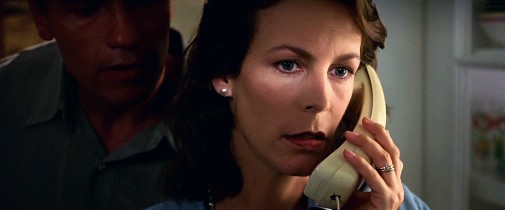
True Lies isn't streaming anywhere right now, but it's easy enough to find on physical media.